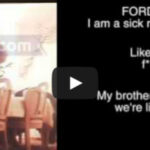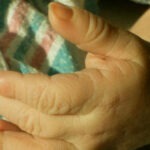
Rob Ford Provokes Unplanned Family Therapy En Masse
November 22, 2013
Excerpt from Family Wakes Us Up: the first post-natal letter
November 29, 2013A post in support of Family Wakes Us Up, a book I’m co-writing with Michael Stone. Please support the publication by donating here. Thank you!
_________
Our son Jacob is thirteen months. From dawn till dusk he treads the threshold between the togetherness we share with him and the secret space he is beginning to find in himself. At this age – all ages pass so quickly! – the contrast between the two is most visible in his relationship to books.
After his first nurse and fresh diaper of the day, we use our excitement-voices: “Should we go downstairs and read some BOOKS?” He laughs and claps. He sits with his mom and tears, literally, into the pile of picture books, showing her his favourite pages, ooing and aahing, pointing out a car, or pumpkin, or dancer. He barks at every dog and squeezes out his proto-version of the word, a loud and guttural whisper of d and g. If he sees a plane he yells “Up, up!” He turns a page and sees a big tabby cat and sniggers, and then lays his head down on the picture as if he’s cuddling up with our housecat, Krishna. He’ll snuggle the page and whisper krish, krish. We are obviously not reading the books to him. He is performing the books to us. This is a small part of beginning to read the world of his endless surprise, and to measure his discoveries against our responses.
But at other times, he uses books to fold himself inwards, away from our attention and, more importantly, our approval. Often when I’m on solo duty I’ll be cooking or cleaning and notice that he’s a little too quiet just around the corner. When I peak I see him sitting stock-straight on the little meditation cushion of his diaper, with a big book in his lap. He gazes at each page for a long time. He sometimes traces his finger over the letters, or around the contours of the picture. Sometimes he whispers stories made up of nouns alone — some recognizable, some improvised. His sounds for “dog” and “up” and “pumpkin” interspersed with repeated syllables and rhythmic humming. (I imagine verbs come after nouns because the toddler’s movements themselves are the verbs.) When he turns the page, he turns it slowly, without breaking his absorption.
If he becomes aware of me, the spell is broken: he’ll want to show me something and to resume the dialogue of our relationship. So I hide and watch him silently, trying not to break the spell. It feels like the most important thing I can do is to recognize that this Jacob-bubble is his space and time, and to commit to not interrupting it. How could I possibly know what he is meant to discover? I pull my attention back into “witness mode” to better allow his inner life to blossom. Strangely, as I do so, I feel my own inner life blossom as well.
Jacob is exploring a new kind of space, and it’s different from the space of revealing his fascinations in dialogue with his parents. He’s entranced, listening to his own impressions and perhaps fantasies, slowly progressing towards an internal verbal tapestry that no other person will ever fully hear. His attention is like a thin line linking thing to thing in space, in the same way that he’s wiring neuron to neuron in the soft folds of his brain. This is here, and then this, and then this is over here. The thin line becomes a story without details, which is perhaps just the feeling of time passing, one breath at a time – before the meaning of time sets in.
What’s crucial to this inner space is that it happens in those brief but growing moments that he doesn’t need me, as he makes the slow but necessary transition into forming within himself the internal trust and presence I at least try to model. He is learning how to be alone, not only safely, but with pleasure. Hopefully, he’s learning to hold that secret life in such a way that doesn’t automatically lead to the feelings of alienation with which most of us are familiar: “You don’t know me.” He is allowed to enjoy a secret world that not even his parents can know. And someday he may see that everyone has this secret world, and that this is what makes us so mysterious and so loveable.
Jacob’s “capacity to be alone” – to borrow the insight from D.W. Winnicott’s 1958 essay of the same title – isn’t emerging on its own, or by him being in the next room. It comes through a process of being able to be alone while beside me. It comes through witnessing me at close range being comfortably alone with myself. But way deeper than this, he has spent thousands of hours with his mother, feeling the gentle difference between her gaze upon him and her attention diverted to her other needs and interests. I love watching my partner holding him and gazing contemplatively out of the window, while he sucks his thumb and considers in detail the sunlight in the room. Mom and baby are with each other, but not dependent upon each other’s attention. They are alone together, but still comfortable and secure. It’s an amazing achievement.
There’s been a flurry of concern over the impact of technological distraction upon these intimacies of family life. Rightly so: we instinctively know when we’re disconnecting from the closeness of the living room or kitchen by checking our phones. But we should also remember that being present to our babies and toddlers will always be a mixture of attentions: together in one moment, alone-together in the next. At this point, Jacob is nourished by both my overt interaction with him, and by witnessing my own comfortable privacy, with a book, gazing through the window, or writing this post with the laptop screen turned so he can’t see it. I try to show him that I have good secrets, and that he needn’t be afraid of what he doesn’t know.
What is this comfortable privacy? It’s my ability – when I have it – to rest in myself and with my own activities, to rarely interrupt his rhythms to fix something, ask questions, or try to make something more comfortable. I want to give Jacob the warmth of watching me be okay doing something, or nothing. I want to model contentment: the fact that more often than we think, life requires no intervention. And that while we never know the content of each other’s secrets, we can share the knowledge that a secret silence connects us.